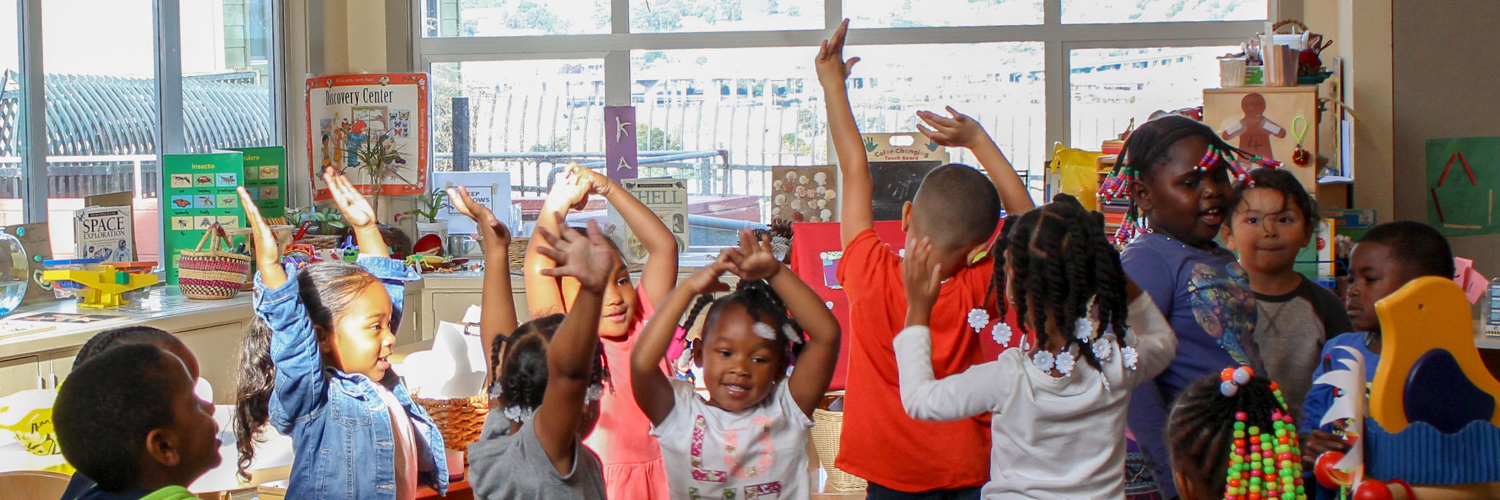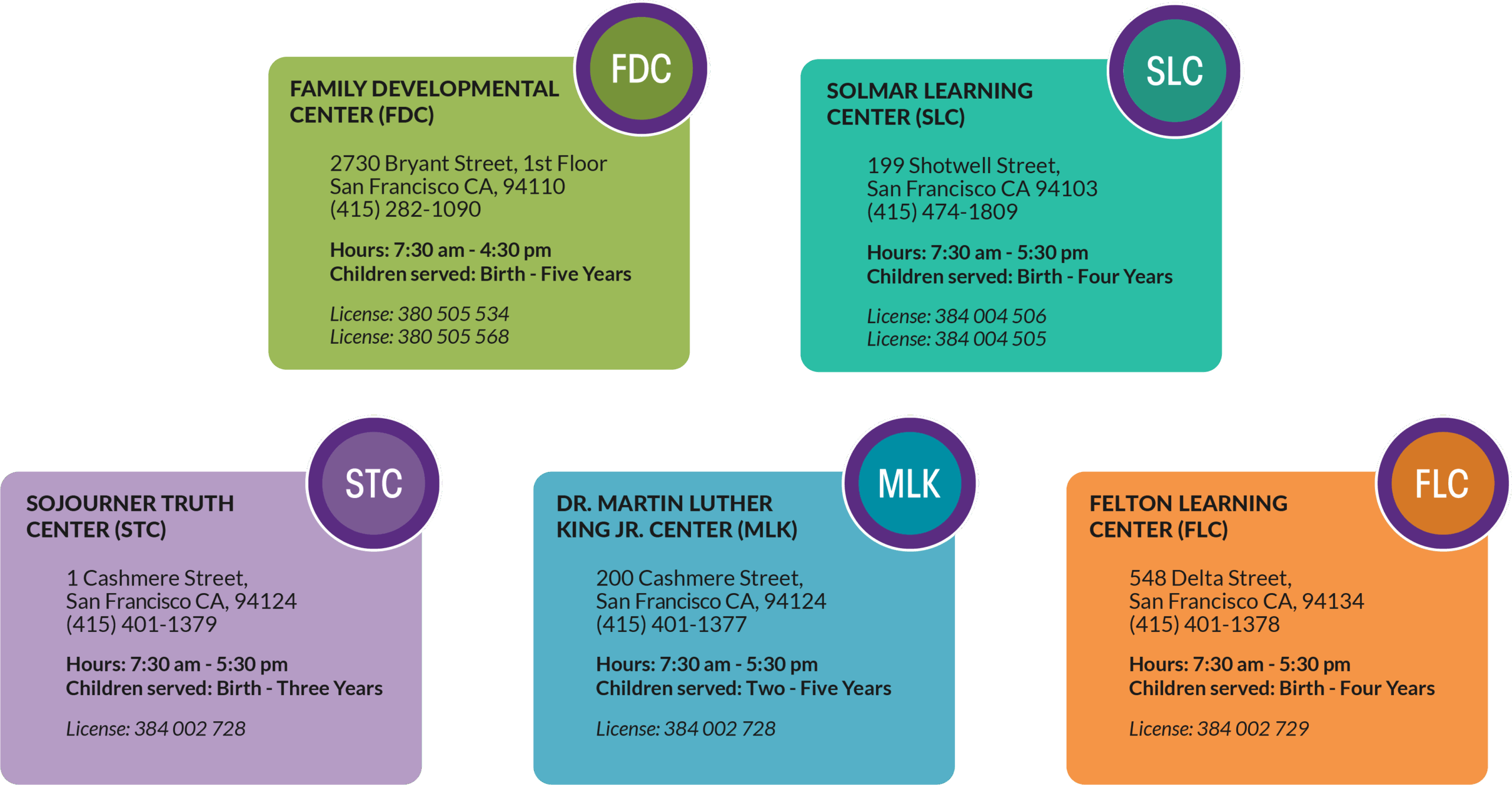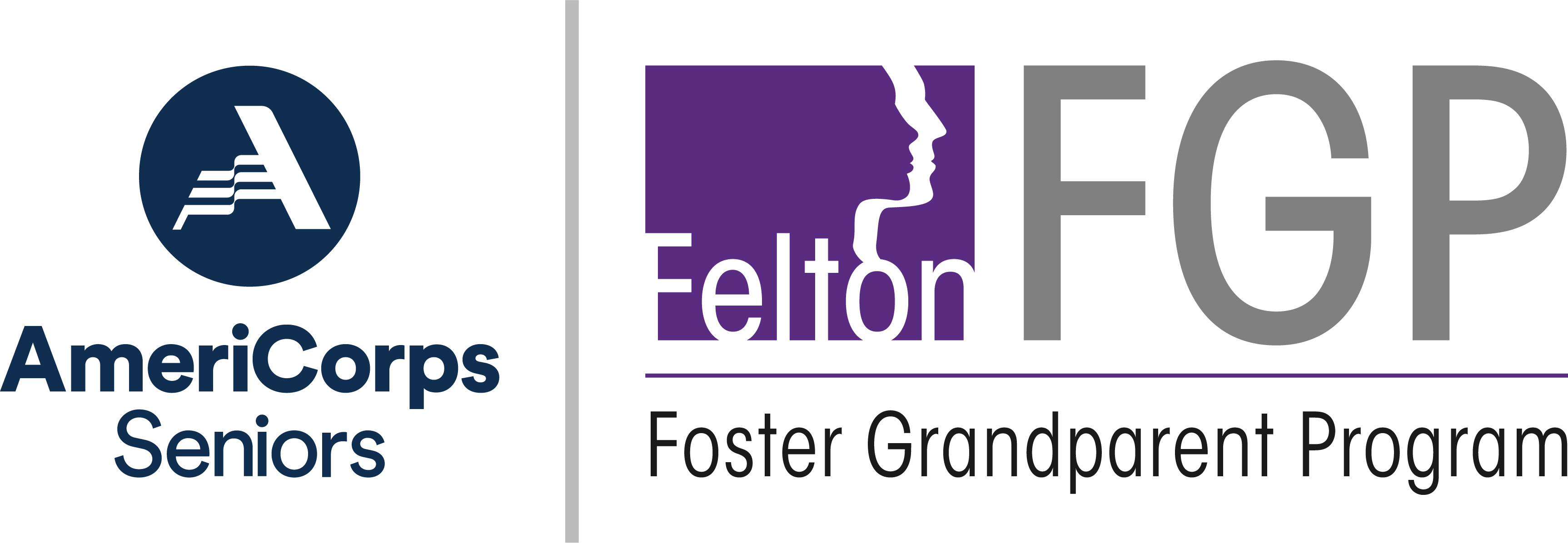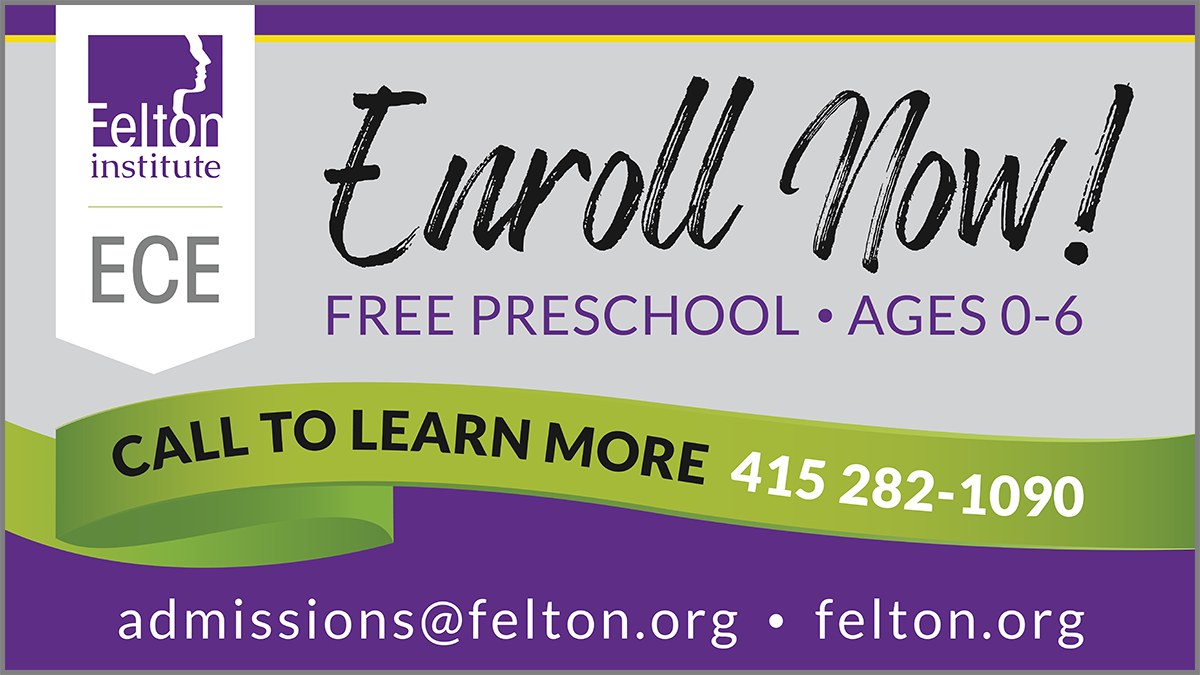Felton Early Care and Education Program’s Educational Philosophy
Vision Statement
In partnership with families, provide a community in which all children entrusted in our care are safe, valued and receive individualized learning opportunities to support the abilities and skills of the whole child allowing them and their families to reach their full potential for success as lifelong learners.
Mission Statement
Our mission is to provide responsive developmental early care and education services in an equitable, nurturing, challenging and inclusive environment that addresses the medical, social and educational needs of the child and family, thereby helping them develop a solid foundation for lifelong development, family economic success and hope for a successful future.
Care Values
- Every child will be provided the opportunity to learn, thrive and fully develop in all competencies at his/her pace
- We are committed to an integrated program model which includes children with special needs
- Services will be provided in a manner that respects the culture, language and ethnic values of each child
- Access to developmental child care services will be equitable and no family will be discriminated on the basis of race, religion, national origin, physical or mental disability or perceived disability
- The child’s family will be an integral part of the development of the curriculum, activities and progress of evaluations
- We will maintain a highly qualified, diverse and motivated teaching staff
- Administrative and programmatic leadership will work to identify and utilize all community, social services, medical and other resources available to support the children and families being served
Why Early Care and Education Matters
High-quality early care and education programs (birth through age five) help prepare children for school and life success. Children in high-quality programs tend to have:
- More advanced language and pre-math skills
- More advanced social skills
- Warmer relationships with their teachers
- Fewer behavioral challenges
- Easier adjustment to kindergarten
Children from low-income families and those at risk for academic challenges show the biggest gains from high-quality early care and education. Those are also the child populations who, on average, start kindergarten behind their peers in literacy and language skills.
A high-quality education in the early grades (kindergarten through third grade) helps young children maintain developmental and learning gains, while lack of academic progress in the early elementary school years can be predictive of later academic challenges.
- Children who are not reading proficiently by the end of the third grade are four times more likely not to graduate, and for children of color that rate doubles
- Chronic absences in elementary school predict future academic challenges
- Reading problems among third to fifth-grade students correlate with later learning, life, and economic challenges, including lower adult literacy, youth delinquency, and later incarcerations, and lifelong economic challenges.
- Reading challenges in the early elementary school years also impact students’ ability to succeed in middle and high-school math.

Felton’s Early Care and Education Programs Overview
Felton has demonstrated a long-term commitment to providing research-based early care and education services. It employs research-based assessments and curricula aligned to the California Department of Education, First Five San Francisco and the Office of Early Care and Education standards. It ensures that even children with physical and developmental conditions can succeed in the classroom by providing extensive early intervention services.
Felton Institute has been providing comprehensive early care and education services in San Francisco since 1971. The ECE programs are primarily funded by the California Department of Education’s Early Education Division, the California Department of Social Services (CDSS), the San Francisco Department of Early Childhood (DEC) and the Mimi and Peter HAAS fund.
We serve the City and County of San Francisco with centers located in the Mission District and Bayview–Hunters Point. Felton operates programs in these neighborhoods, offering both Infant/Toddler and Preschool classrooms that provide full-day, year-round care. Hours of operation vary by site, but most centers are open Monday through Friday from 7:30 AM to 5:30 PM.
- Family Developmental Center (FDC), Ages Birth – 5 Years
- Solmar Learning Center (SLC), Ages Birth – 4 Years
- Sojourner Truth Center (STC), Ages Birth – 3 Years
- Martin Luther King Jr. Center (MLK), Ages 2 – 5 Years
- Coming Soon | Felton Learning Center (FLC), Ages Birth – 4 Years
Family Partnerships and Involvement
In order to ensure a healthy, communicative partnership, families are expected to participate in Felton events and/or educational activities annually. These include the intake process and Family/Teacher conferences in the winter and spring. Others may include informational workshops, peer support groups, Parent Advisory Committee meetings, daytime sponsored events, field trips, volunteering in the classroom or center, or any additional conferences or meetings as requested by the staff at Felton.
Parent-Teacher conferences, discussion of assessments and open communication about a child’s progress are critical to developing trust in the developmental education available at Felton. Parents’ participation in the classroom is welcome and necessary. The developmental progress of children can be fostered when we forge a united front to prepare them for any school system and for lifelong learning.
Felton believes the first and most important educator is the child’s parent. The educational system, including Felton, represents the support team. Once a child is enrolled at Felton, as partners, the family and staff make every effort to utilize every opportunity to work together to give your child pleasant and repetitive learning opportunities.
Felton believes that parent involvement is vital to the success of a child’s program and subsequent development. Consequently, the relationship between staff and parents is an integral part of providing a quality program for young children. Staff demonstrates the value of this relationship by acknowledging:
- The influence of the parent on the developing child as the child’s first teacher
- The importance of the family’s goals for the child
- The lifestyle of each family and unique styles of child-rearing
- The unique beliefs and value systems of each family
- The family’s ethnic, cultural, and religious background
- The desire of parents to learn about their children
- The pride parents take in their children and their children’s accomplishments
- The value of parental input and contribution to Felton’s Early Care and Education Programs
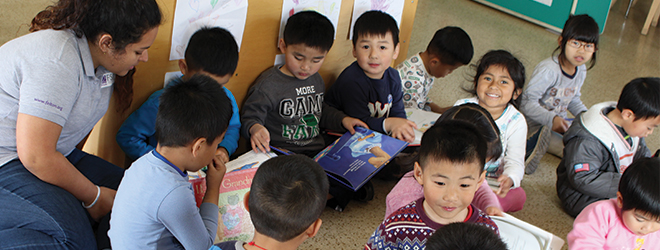
Inclusion, Primary Care Model and Relationship-Based Approach
Our programs offer an inclusive learning environment. Inclusion means making the benefits of high-quality care available to all children through appropriate accommodation support in order for a child with special needs to have full active program participation. Felton makes every reasonable accommodation to encourage full participation in our programs based on the individual needs and abilities of each child. As needed and as funding allows, a child will receive early intervention services in an inclusive early learning environment, alongside his or her typically developing peers. ECE Teachers and early intervention professionals work together to provide responsive early intervention services, while also meeting the culturally and linguistically diverse population of San Francisco.
In a primary care system, each child is assigned to one teacher who is primarily responsible for that child’s care and individual needs and progress. According to the Program for Infant Toddler Care (PITC) when children spend a longer day in care than their primary infant/toddler care teacher, a second infant/toddler care teacher is assigned to be the primary relationship. Each child should have a special infant/toddler care teacher assigned to him or her at all times during the child care day. Teaming is also important. Primary care works best when infant/toddler care teachers team up and support each other and provide a back-up base for security for each other’s primary care children. Primary care does not mean exclusive care. It means, however, that all parties know who has primary responsibility for each child.
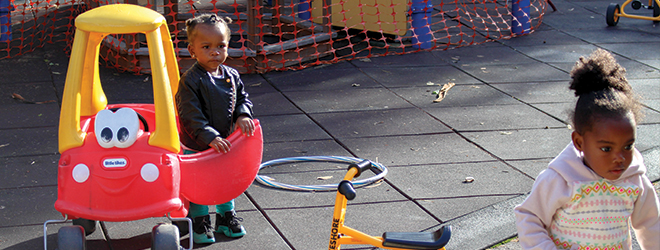
Every major research study on early care and education has shown that small group size and good ratios are key components of quality care. Felton’s ECE programs have the following ratios:
- Infants Birth – 18 months 1:1, 1:2 or 1:3
- Toddlers 18 – 36 months 1:2 or 1:4
- Young Preschoolers 36 – 60 months 1:6
- Preschoolers 60 – 72 months 1:6
A relationship-based approach to the provision of care that is individualized, and responsive to the child’s cues and desires to learn – is important for all children. Children who have responsive, enduring relationships develop emotional security, which gives them the foundation for becoming socially competent and resilient.
Curriculum
Felton believes that the following are essential components in helping all children reach their potential across all developmental domains:
- Consistent use of research-validated assessment tools and curriculum that has demonstrated consistent acceleration of child development across developmental and physical domains
- Early intervention conducted within inclusive, natural environments that are developmentally appropriate & provide a nurturing environment
- Building parent capacity through parent participation, education & support; and Individual learning plans that meet the needs/interests of each child & family
- The incredible view from the Martin Luther King Jr. Center in San Francisco, CA.

Our early childhood educators are trained in and implement The Creative Curriculum for Infant, Toddler and Preschool, a nationally recognized play-based curriculum designed to help children develop their social competence, positive approach to learning, and the pre-academic skills needed to succeed as learners. In addition, we incorporate other elements of developmentally appropriate curriculum sources, and integrate them as fitting to the learning needs and cultural context of the children served; those curriculum sources include but are not limited to Emergent Curriculum, Project Approach / Reggio Emilia and some elements of High Scope. Teachers and Early Interventionists focus on developmentally appropriate activities based on children’s age and interests and make adaptations in order to meet the individual needs of children including those with identified special needs.
We focus on providing activities that encourage Social, Emotional, Physical and Cognitive development. The classrooms are structured to support children’s learning through hands-on experiences of toys and materials, small/large group play, and individual exploration. All learning: Social, emotional, fine /gross motor and cognitive is accelerated when experiences are repetitive, consistent, predictable, nurturing and fun. We provide opportunities for play-based learning activities through:
- Blocks and Manipulative toys
- Imaginative/Dramatic play
- Books and Reading
- Gross Motor- Outdoor activities Art & Science
- Water and Sand play
- Group times
- Music, Movement & Relaxation
Our goal is to encourage each child’s natural curiosity, risk-taking and interest in learning. We feel it is important for children to actively participate in the learning process, and therefore provide many opportunities for hands-on learning, for both indirect and direct acquisition of new knowledge and skills.
Infant Curriculum- Birth – 18 months
In the Infant classroom, staff follows each child’s individual schedule so that curriculum and schedules happen naturally and differently each day. Activities are based on the child’s interests and abilities.
- Teachers focus on establishing relationships with the Infants and supporting them to feel safe and comfortable
- We do not establish a structured schedule; instead, our teachers follow the children’s individual schedules to meet their basic needs and support their development in all areas
- An individualized learning program according to the needs & interests of the infant
- Taking care of the infants at Felton’s Sojourner Truth Center in San Francisco, CA.
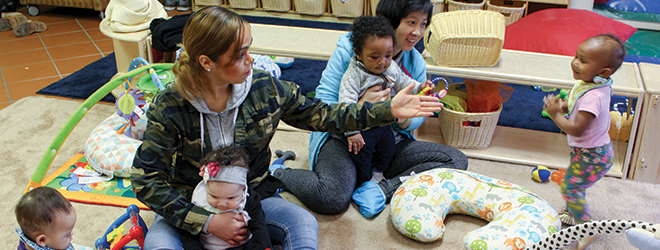
Toddler Curriculum- 18 – 36 months
Children are encouraged to develop and become confident with their newly discovered independence as they explore their environment.
As Teachers meet the basic needs of children, they also support children to develop & use self-help skills. At this age, routines and limits are essential to help children predict the events that will occur during the day as well as determine their boundaries.
Preschool Curriculum 36 – 72 months
The focus in our Preschool classrooms is to provide a curriculum that prepares children for a lifetime of learning by introducing them to focused interest centers that encompass a wide range of activities.
Basic developmentally appropriate concepts of math, language, reading, social and physical skills through creative, interactive activities are formally emphasized. We continue to support children as they further develop their self-esteem and independence skills.
Felton’s School Readiness Goals
Felton’s Early Care and Education Programs maintain a focus on key learning and developmental goals related to cognitive, language, perceptual and motor, and social-emotional growth increasing the complexity of child activities, focused on the following child development goals:
- Establish strong relationships with teachers and to feel safe and comfortable
- Develop strong peer relationships
- Learn to regulate their behavior and emotions
- Internalize routines and rules
- Build confidence and self-esteem
- Build language, pre-literacy and oral language skills
- Build innate curiosity and persistence in problem-solving
- Build capacity to understand and use beginning math concepts
- Build large motor skills related to movement, balance and navigation
- Develop fine motor skills and smaller muscles for manipulation of objects
Dual Language Programming
Currently, at our Mission site, approximately 65% of the families served are recent US immigrant families whose primary language is Spanish. Felton’s Early Care and Education Programs provide a bilingual curriculum in which children continue to build their native language while acquiring English as a second language.
Our teachers are trained in techniques to promote early literacy in English language learners. Four classrooms are part of a pathway, where children are exposed to English & Spanish in a systematic and structured way. In these DLL classrooms, we offer a teacher-based language model. This means that one teacher will speak only Spanish while another will speak only English. This method is used to help strengthen children’s skills in both languages while still allowing all children to be exposed to both.
Below is the pathway:

Childcare Food Program
At Felton’s Early Care and Education programs, our focus is to provide nutritional foods to enhance the health, well-being, development and educational potential of the young children in our care. The Food Program links to the overall child development program philosophy by providing a nutritious breakfast, a.m. snack, lunch and a p.m. snack. Children are introduced to a wide variety of fresh fruits, vegetables, whole grains, and protein foods which develop lifelong healthy eating habits and promote kindergarten readiness. We are fortunate to have a central kitchen and cook to prepare nutritious meals daily. These meals are served to each classroom where classroom teachers help make the mealtime a social experience with the children in order to develop strong verbal and cognitive skills. Eating well is important not only for a growing body, but for a child’s mind too. By serving healthy foods and making meals a time for learning, children become better communicators, better readers and learners. In addition, while enrolled at Felton, children develop an improved appreciation of a wide variety of foods.
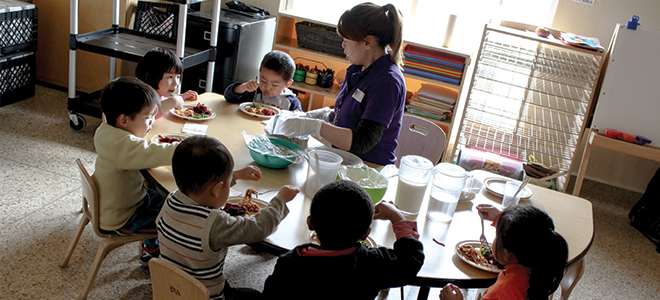
Developmental Screenings, Observations and Developmental Assessments
Ages and Stages Questionnaire 3rd Edition (ASQ-3) and Ages and Stages Social-Emotional (ASQ-SE) Screening Tools
During the first five years of life, infants, toddlers, and preschool-age children are growing and developing important milestones. Detecting delays in development are vital during this age range so that early intervention programs can support the child in advancing to their fullest potential. Children with untreated delays are at an increased risk for poorer health status and academic achievement (Hamilton, 2006; Pinto, Dunkle, Earls, Fiedner, & Landes, 2005). Studies have shown that high-risk children who received early intervention services have improved long-term health outcomes, higher academic achievement, decrease criminal activity, better employment, and higher income. High-risk children are premature infants, low-birthweight infants, and/or come from low socio-economic households (Hamilton, 2006). Therefore, screening and providing appropriate treatment or intervention to children under five years of age is important and can lead to long-term positive outcomes for both the child and the community.
When a new child enrolls at any of Felton’s ECE programs, the admissions team will complete the ASQ-3 and ASQ-SE with the family within 30 days of enrollment, or when a child who is currently in the program turns 48 months. Children who already have an identified special need/diagnosis are excluded from this process, as it has already been determined that the child has delays and his or her development. Therefore, the screening process is not of any benefit to the child or family.
Observations
Daily, during activities Teachers observe and document objective observations / anecdotal notes:
- Snapshot of what child says or does, a child’s skill level
DRDP (2015) Developmental Assessment
Felton’s ECE Programs implement the Desired Results System which was established by The California Department of Education (CDE), Early Education and Support Division (EESD), to improve program quality in early care and education centers across the state. The Desired Results Developmental Profile© (2015) is a Developmental Continuum from Early Infancy up to Kindergarten Entry. The DRDP© (2015) assessment is designed for teachers to observe, document, and reflect on the learning, development, and progress of children, birth through six years of age, who are enrolled in early care and education programs. The assessment results are intended to be used by the teacher to plan curriculum for individual children and groups of children and to guide continuous program improvement.
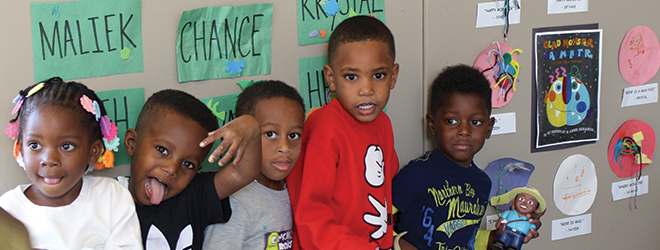
Felton uses the (DRDP-2015) to assess a child’s development and progress. These assessments are completed within 60 days of a child’s initial enrollment in the program and every six months thereafter (Children Birth- 60 months). After completing the DRDP-r the teacher summarizes a child’s progress and plans on the Child’s Developmental Progress form, in preparation for a Parent Conference. Parent/teacher conferences are held two times per year, in which teachers discuss the assessment outcomes with families and ways in which they can continue to support their child’s growth and development.
The four Desired Results for children are:
- Children are personally and socially competent
- Children are effective learners
- Children show physical and motor competence
- Children are safe and healthy
The two Desired Results for the family are:
- Families support their child’s learning and development
- Families achieve their goals
Felton’s Early Care and Education Discipline Approach
Felton uses the CA CSEFEL Teaching Pyramid Framework as one way of promoting children’s healthy social-emotional development.
In social settings where young children are just beginning to explore and experiment with ways of interacting effectively with their peers, it is not unusual for incidences of aggression to occur. At certain stages in early childhood development, children’s desire to communicate their feelings and the need to assert themselves as individuals may often be expressed in non-constructive ways. Children at this stage in their development may sometimes express themselves by hitting another child, grabbing toys, or even biting. Felton is committed to the education and development of young children, we understand the developmental context in which these behaviors may occur, and we provide an environment where children can develop and grow as individuals as they learn more constructive ways of interacting with their peers.

Discipline is the process of helping children understand social limitations, develop self-control and promote positive social behavior.
Here are some of the strategies Felton uses:
Prevention and reduction of conflict and misbehavior can be achieved when children are engaged in stimulating and constructive play in a developmentally appropriate environment while being supervised by trained staff.
Redirection is the process of positively guiding children away from unacceptable behavior by suggesting alternative activities and actions. Positive guidance is avoiding the use of the word “No” and replacing it with communicating to the child what he/she can do as opposed to telling him what he/she cannot do.
Program Expectations
Felton Institute’s Early Care and Education Programs are committed to each child’s success in an inclusive, caring and responsive and safe learning environment. Our centers strive to ensure that all children have the opportunity and support to develop to their fullest potential.
We encourage children to be friendly, healthy, safe and respectful to others and property.
The Teaching Pyramid model provides the best learning environment for young children. Felton Institute adopted this approach after our teaching and administrative staff completed a full-year, on-site training program. Training continues on a regular basis. This teaching model builds positive relationships between teachers and children as well as with families and other professionals in order to ensure the social, emotional and behavioral development of each child. It is our goal to ensure positive, trusting and open relationships with your child so he/she will feel valued, have a positive self-concept and self-confidence, and therefore, be well equipped to effectively interact with others in his/her environment. Children notice and are responsive to caring adults.

Teacher Qualifications
Felton employs highly qualified and experienced early childhood educators, Head Teachers, Teachers and Teacher’s Assistants, and Program Supervisors. Most Head Teachers and Program Supervisors hold a Bachelor’s degree in Child & Adolescent Development or similar fields, or at a minimum hold a Child Development Site Supervisor Permit from the California Commission on Teacher Credentialing. Each Teacher possesses a California Child Development Associate Teacher permit or higher and has at least twenty-four units in Early Childhood Education. Some of our teachers have an Associate Degree in Early Childhood Education. Lastly, Teacher’s Assistants have at least six ECE units and a minimum of one year of experience working with young children.
In addition, all classroom staff holds a teaching credential from the Commission on Teacher Credentialing from the State of California.
The credentials are:
- Teacher Assistant
- Associate Teacher
- Teacher
- Master Teacher
- Site Supervisor/Program Director
Credentials are renewed every five years and require college courses, attendance at professional seminars, or a combination of both to total 105 hours of study.
Felton Institute staff also:
- All have cleared a background check by the Department of Justice, and Child Abuse Index
- All have an updated health screening on file, a negative tuberculosis test, and any other required immunizations
- All classroom teachers are CPR & First Aid Certified and receive at least 15 hours of health and safety training every year.
Transitioning to Elementary Schools
Felton’s Early Care and Education programs assist families in the transition from the center to an elementary school. The Admissions Team provides families with information on local elementary schools, help them with ideas on how to talk to their child about going to elementary school, and provides information on what to expect. Transition activities are integrated into the preschool, pre-kindergarten, and kindergarten curricula. Information sessions such as “Kindergarten Night” are hosted in partnership with the San Francisco Unified School District.
All children can learn and succeed, but not on the same day in the same way! We are creating a strong foundation for stronger and more empowered communities.
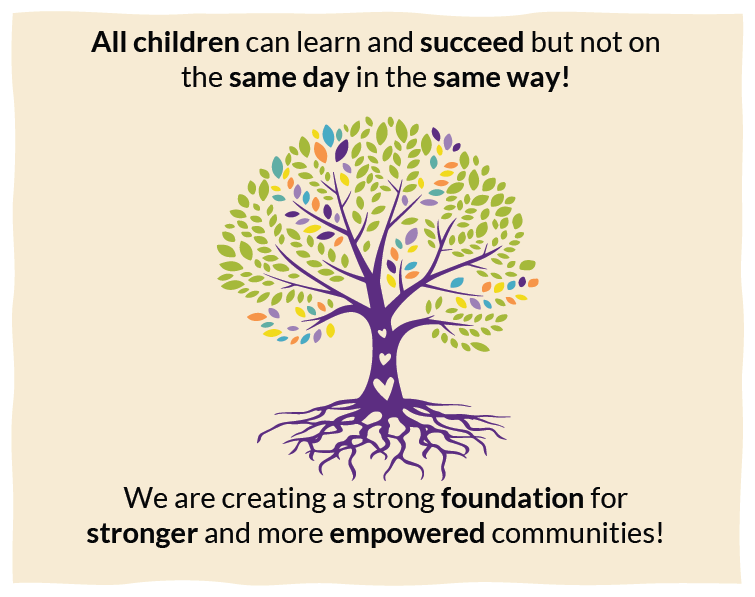
Multigenerational Programs
Recognizing the importance of intergenerational interaction, the ECE programs engage with AmeriCorps Seniors volunteers in our Foster Grandparent Program.
Through Felton Institute’s Foster Grandparent Program, young children and older adults develop meaningful relationships and shared experiences. Participants in our Foster Grandparent Program are older adults ages 55 and older who offer support, love and wisdom to children and youth in our Bay Area. AmeriCorps Seniors volunteers serve between 15 and 30 hours a week in preschools, elementary schools and various community settings.

AmeriCorps Seniors volunteers are tutors, mentors and friends who enrich young lives by sharing knowledge and experience through one-on-one classroom activities, reading support, creative play, field trips and much more. Our AmeriCorps Seniors volunteers have a passion for helping children and youth to succeed. They bring their unique talents, kindness, focus and consistency to the children they support, who often do not have an older adult with whom to connect.
Early Educator Engagement and Empowerment (E4) Toolkit
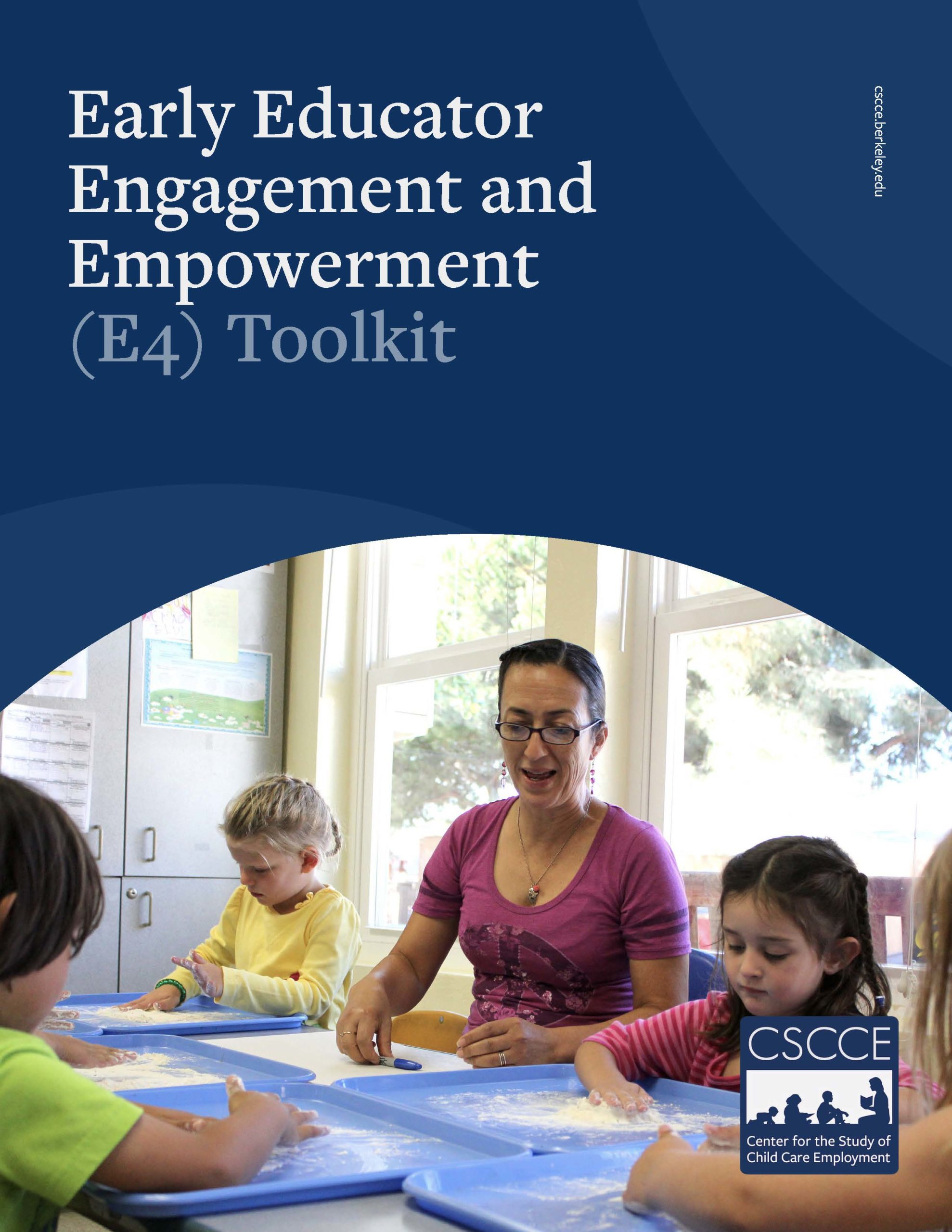 Felton’s ECE educators and programs are featured in the Early Educator Engagement and Empowerment (E4) Toolkit. Created by UC Berkeley’s Center for the Study of Child Care Employment (CSCCE), it provides invaluable data, resources, and advocacy for educators and educational leaders.
Felton’s ECE educators and programs are featured in the Early Educator Engagement and Empowerment (E4) Toolkit. Created by UC Berkeley’s Center for the Study of Child Care Employment (CSCCE), it provides invaluable data, resources, and advocacy for educators and educational leaders.
Felton’s COO Dr. Yohana Quiroz provided her expertise and feedback in the creation of this toolkit.
Footnotes
- U.S. Department of Education. (2015). A Matter of Equity: Preschool in America. Retrieved from https://www2.ed.gov/documents/early-learning/matter-equity-preschool-america.pdf ↵
- Schuyler Center for Analysis and Advocacy. (2012). Quality: What it Is and Why it Matters in Early Childhood Education. Retrieved from https://www.scaany.org/documents/quality_earlyed_scaapolicybrief_sept2012.pdf ↵
- The Research Base for a Birth through Eight State Policy Framework. (2013) .Child Trends. Retrieved from http://www.childtrends.org/wp-content/uploads/2013/10/2013-42AllianceBirthto81.pdf ↵
- U.S. Department of Education. (2015). A Matter of Equity: Preschool in America, op cit. ↵
- Education Commission of the States. (2016). Companion Report: 50-State Comparison: K-3 Quality. Retrieved from http://www.ecs.org/ec-content/uploads/50-State-Comparison-K-3-Quality_Updated-1.pdf and Darling-Hammond, L. (2000). Teacher quality and student achievement: A review of state policy evidence. Education Policy Analysis Archives, 8(1). Retrieved from http://epaa.asu.edu/epaa/v8n1/ ↵
- Annie E. Casey Foundation (2013). Early Warning Confirmed. Retrieved from http://www.aecf.org/m/resourcedoc/aecf-EarlyWarningConfirmedExecSummary-2013.pdf ↵
- Education Commission of the States. (2010). Chronic Early Absence. Retrieved from http://www.ecs.org/clearinghouse/84/20/8420.pdf ↵
- Simonton, S. (2016, July 18). Reading Difficulty in Young Children Linked to Later Trouble with the Law. Juvenile Justice Information Exchange. Retrieved from http://jjie.org/2016/07/18/reading-difficulty-in-young-children-linked-to-later-trouble-with-the-law/ ↵
- Fite, G. (2002). Reading and Math: What’s the Connection. Retrieved from https://www.emporia.edu/dotAsset/9acbacde-104d-4b37-b13a-ffc1ec7885cb.pdf ↵
Enrollment Information
Families must apply through the “SF3C” program. For more information, please call their Resource and Referral Line: (415) 343-3300.
How do I apply?
- Apply Online at earlylearningsf.org
- Apply by phone at (415) 343-3300 or (415) 391-4956
You can return the completed SF3C application by mail or in person to one of the following locations:
- Children’s Council of San Francisco, 445 Church Street (@16th Street), San Francisco, CA 94114
- Wu Yee Children’s Services, 888 Clay Street, Lower Level (@Stockton Street) San Francisco, CA 94108
ENROLLMENT CONTACT INFORMATION
Hours (Mon-Fri): 8:30 AM – 5:30 PM
For more information on enrollment, please contact Felton Institute’s Early Care and Education (ECE) Programs Admissions at:
Felton Early Care and Education Programs (ECE)
Address: 2730 Bryant Street, 1st Floor, San Francisco, CA 94110
Main Office Phone: (415) 282-1090, ask for the Admissions program
Fax: (415) 282-1735
Enrollment Email: admissions@felton.org
GENERAL CONTACT INFORMATION
Felton Early Care and Education Programs (ECE)
Main Office Address: 2730 Bryant Street, 1st Floor, San Francisco, CA 94110
Main Office Phone: (415) 282-1090, ask for the ECE programs
Fax: (415) 282-1735
Email: ece@felton.org
For more information, please contact:
Yohana I. Quiróz, Ed.D., Felton Institute Chief Operations Officer (COO),
Division Director, Children, Youth, Family and Transitional Age Youth Services (CYFTAY)
Email: yquiroz@felton.org
